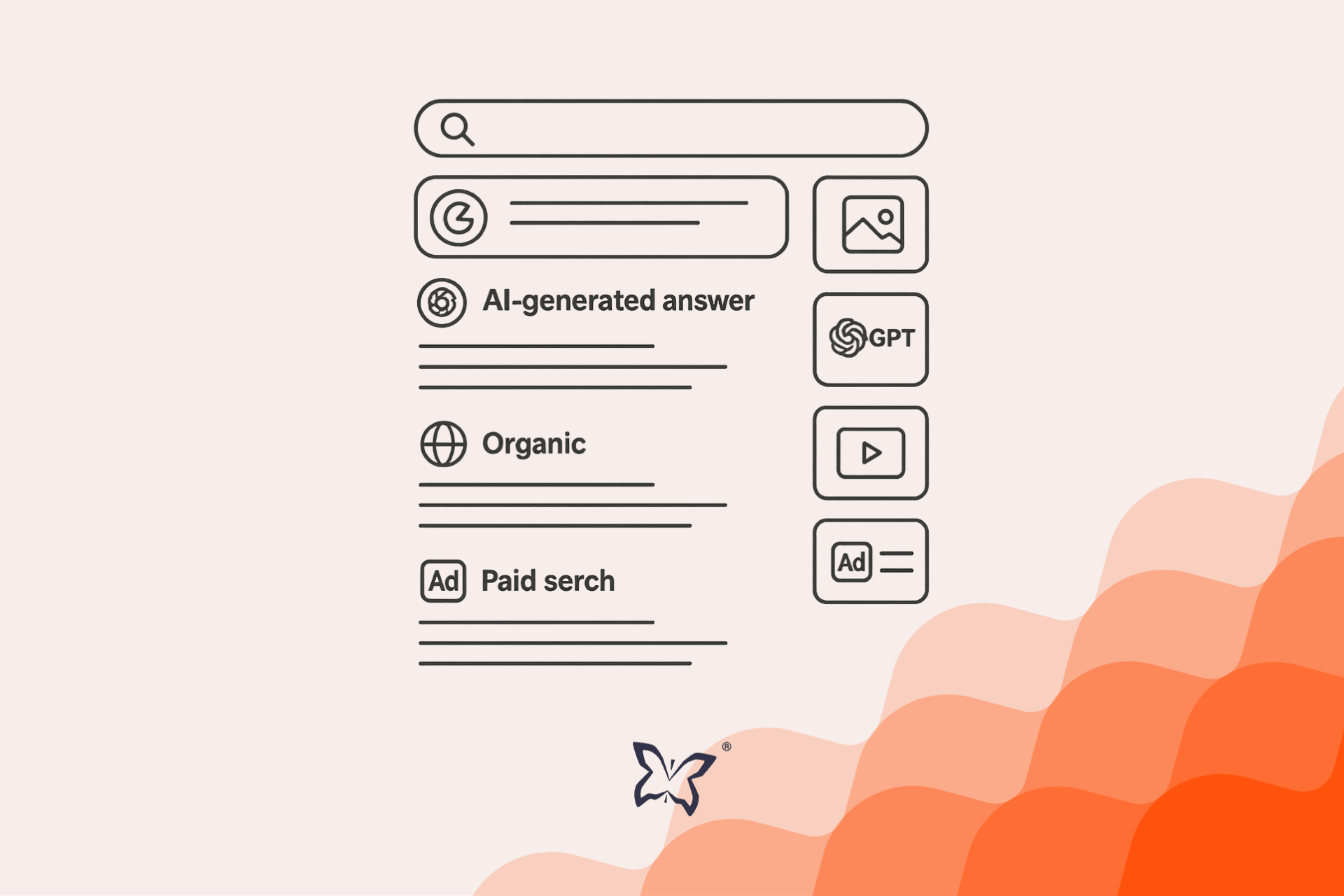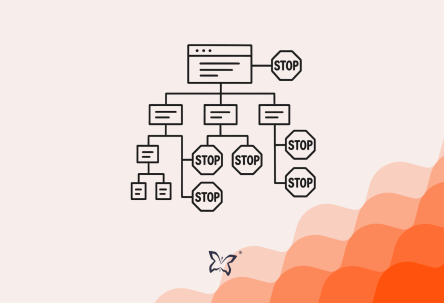We’re taking our meetings online.
We are using a range of online video options so please get in touch to have a chat.

Need expert advice?
Why not give us a call and see how we can help you with your project?
249-315-0775We are using a range of online video options so please get in touch to have a chat.

Why not give us a call and see how we can help you with your project?
249-315-0775Jargon-free, experience-backed insights to guide your digital decisions.

Dan Drummond

Yes. Just not in the way you might think.
Most of the time, when businesses talk about “AI” in digital marketing, they jump straight to tools.
Writing tools. Design tools. Automation tools.
But the real shift is deeper than that. The real shift is this:
AI is changing how people find answers.
And if you’re planning a new website, content strategy, or digital marketing approach, that’s the shift you need to pay attention to.
For years, getting to the top of page one in Google was the benchmark. A reliable goal. A measurable ROI. But now we’re seeing something odd.
Sites are still ranking. Impressions are up. But click-through rates are down.
Why? Because Google, for the first time in over 20 years is reacting rather than leading. AI tools are threatening its model, so it’s cramming more into every results page:
Your website might be featured five times on the page. But it might only earn a fraction of the clicks it used to.
So the question becomes: How do you still get found—and clicked—in a world where the web is being summarised for you?
You don’t beat the AI tools. You feed them.
We’re seeing more traffic from AI tools themselves: platforms like ChatGPT, Gemini, and Perplexity. And unlike Google, these aren’t just search engines. They’re answer engines. People are typing full, nuanced questions directly into these tools, often bypassing traditional search engines altogether.
If your content doesn’t help answer those questions clearly and confidently, you’re not part of the result. And hence you’re not part of the conversation.
That means your website needs to do more than rank. It needs to explain. It needs to answer. It needs to make sense when lifted out of context.
This is where Discovery forms a key part of planning a new website or content strategy.
Most businesses aren’t great at identifying what their customers are actually trying to do—let alone the questions those customers are asking along the way. Even senior leadership teams often default to internal priorities rather than external needs. Assumptions slip in. Guesswork becomes content. Notions become sacred cows.
A proper discovery phase helps break that cycle. It brings focus, and a bit of friction. It gives you time and space to ask the right questions. To challenge what you think you know. And to start seeing the business from the outside in.
That clarity doesn’t just shape your sitemap or UX. It directly informs your content strategy, because now, you're not guessing at what to say. You’re answering real questions. You’re reflecting the words and needs of your actual customers. And you're doing it in a way that helps both people and AI tools understand the value you offer.
Done right, Discovery becomes the foundation for your entire digital strategy, not a separate activity, but a crucial part of how you plan, write, and structure your site from day one.
With organic search becoming less predictable, paid channels are becoming essential to help generate leads and drive traffic to your site.
But this isn’t about throwing money at the problem.
Paid search is most effective when it’s aligned with your website’s structure, messaging, and customer journey. That’s why we often link it directly to discovery—because the clearer your customer proposition is, the more relevant and targeted your ads become.
Add in ROI tracking (through tools like morphBI), and you can start to connect actual sales performance to specific campaigns and landing pages. This gives you a much clearer picture of what’s working and what’s not, and helps you improve results over time.
So if you're wondering how to make better use of your ad spend—or how to make sure your website isn’t holding your campaigns back, it’s not just a media buying problem. It’s a strategic one. And it starts upstream.
If you’re planning a new website—or trying to make your current one perform better—here are a few questions worth asking:
AI isn’t just another tool. It’s a shift in how people research, decide, and buy.
Your digital strategy—including your website, your content, your ads—needs to meet that shift head-on.
And it all starts with asking better questions.
A proper discovery phase helps you understand what your customers really need—and how to turn that into content, structure, and campaigns that perform.
What does AI mean for website planning?
AI is changing how people search for and process information.
Instead of relying solely on Google and other search engines, users are now asking full questions directly in tools like ChatGPT, Gemini, or Perplexity. That means websites need to be structured around answering real customer questions clearly and confidently, not just ranking for keywords.
Is SEO still worth it in 2025?
SEO still matters, but it’s not delivering traffic like it used to.
Search results are more crowded, click-through rates are down, and AI summaries are reducing the need to click. That’s why businesses are now combining SEO with better content strategy, paid search, and ROI tracking.
What is a discovery phase in website planning?
Discovery is the strategic groundwork that happens before design or development.
It helps clarify your goals, understand your customers, and shape your content, structure, and messaging. For most businesses, discovery should be considered an essential first step in any website project to avoid assumptions and guesswork - and to build a site that actually performs.
How do I make sure my website shows up in ChatGPT or Gemini?
AI tools like ChatGPT and Gemini favour clear, context-rich, well-structured content.
That means writing for real questions, using plain language, and showing credibility. Structuring your site clearly and explaining your services or products in customer terms helps AI understand and surface your content in answers.
Should I invest in paid search if SEO traffic is dropping?
Paid search is becoming more important as organic visibility declines.
But it only works if your message is clear and your landing pages convert. That’s why we often link paid search to discovery work—so the campaigns are based on real customer insight—and use tools like morphBI to track ROI properly.
Can I run my own discovery in-house?
In theory, yes. But in practice, it’s difficult.
Most businesses are too close to their own assumptions and internal language. A proper discovery workshop brings outside perspective, structured thinking, and the kind of uncomfortable questions that help reveal what your customers actually need from you.
What does GEO mean in digital marketing?
GEO stands for Generative Engine Optimisation. It’s a new approach to digital strategy focused on helping your business get found in AI-powered tools like ChatGPT, Gemini, and Perplexity.
Unlike SEO, which is about ranking in traditional search engines like Google, GEO is about structuring your content in ways that make it useful, trustworthy, and answerable—so AI tools are more likely to reference your site when users ask questions.
It’s less about keywords, and more about clarity, credibility, and context. The better your site explains what you do and who you help, the more likely you are to show up in the answers.

Head of Digital Strategy
Dan leads our digital marketing team at morphsites. With a sharp eye on SEO, paid search, and ROI tracking, he’s always looking for ways to help businesses make smarter use of their marketing spend...and keep pace with a fast-changing digital landscape.
 PPC Frustrations Part 2 - Why do Google Ads get clicks but still fail to convert?
PPC Frustrations Part 2 - Why do Google Ads get clicks but still fail to convert?
 PPC Frustrations Part 3 - Why don’t Google Ads leads turn into customers?
PPC Frustrations Part 3 - Why don’t Google Ads leads turn into customers?
 PPC Frustrations Part 1 - Why Google Ads often fail before the first ad even runs
PPC Frustrations Part 1 - Why Google Ads often fail before the first ad even runs
 The hidden cost of indecision
The hidden cost of indecision
 Finding the extraordinary in the ordinary
Finding the extraordinary in the ordinary
 Before you build, find out if you should
Before you build, find out if you should
 Are you solving the right problem?
Are you solving the right problem?
 More signal, less noise
More signal, less noise
 Do you still need an agency in 2025 or can AI do it all?
Do you still need an agency in 2025 or can AI do it all?
 Is AI changing how we should plan websites and marketing strategies?
Is AI changing how we should plan websites and marketing strategies?
 Planning a Website or Digital Project? Here’s What to Do First.
Planning a Website or Digital Project? Here’s What to Do First.
 Can AI replace your development team?
Can AI replace your development team?
 Why one client spent 10x more on a custom website and never looked back
Why one client spent 10x more on a custom website and never looked back
 "It’s Fine" and Other Famous Last Words: Why Website Maintenance Isn’t Optional
"It’s Fine" and Other Famous Last Words: Why Website Maintenance Isn’t Optional
Not sure where to start with your digital project?
We’ve guided businesses through complex builds, integrations, and marketing strategies. We’re here to listen, advise, and support, whenever you’re ready.


Before investing in a new website or digital marketing, make sure you’re building the right thing. This article explains the value of strategy, UX, and technical planning through the lens of a well-known brand that skipped discovery and paid the price.

By Pete Fairburn

AI can write code, but should it build your entire platform? Discover the hidden risks of replacing your development team with AI and how to use it safely.

By Pete Fairburn

We were recently asked to review a tender from a local authority. Dozens of pages of requirements, audits, and paperwork, all defining a solution before any real understanding of the problem.

By Pete Fairburn
Need expert advice?
Let’s talk results
© 2026 morphsites Ltd. All rights reserved E&OE. Registered in England no. 07116238. The ‘morphsites’ wordmark and butterfly device are registered trademarks of morphsites Ltd.